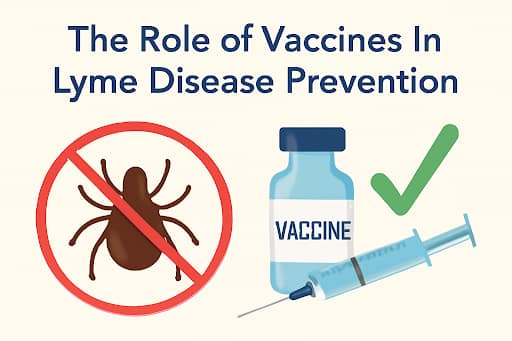
“Prevention is better than cure.” This proverb holds true when discussing the pivotal role of vaccines for ages. Lyme disease has posed a mighty challenge to the entire world. However, this disease can be controlled by vaccination to a great extent thereby limiting the transmission.
This article will discuss all the possible disease control methods, and current ongoing trends in the vaccine research for Lyme disease, and simultaneously explore how exactly the vaccines can help against Lyme disease.
Curious just like me? Let’s dive into the blog.
What is the role of vaccines in Lyme disease prevention?
- Basically what vaccines do to prevent Lyme disease is that it stimulates the immune responses of the body which thereby helps in the reduction of inflammatory toxins and risks of infection in the body. We can regard it as a “tactical” defense for individuals with high exposure risk to Lyme disease.
- The vaccine helps in identifying, and targeting the bacteria in our body. And then communally stimulate the immunity of the body. Vaccines allow the body’s immunity to “learn” how to detect the bacteria before its actual invasion.
- There are places where this bacteria showcases raging behavior. At such places, vaccine strategies totally augment along with other measures like the usage of tick repellents, protective clothes, and so on. The vaccine is one of the useful strategies to combat this peril bacteria in large-scale high-risk areas.
Are there currently vaccines available for Lyme disease?
- There is no Lyme disease vaccine for humans in the market. And there is limited research on this topic of interest.
- However, vaccines are available to protect dogs from Lyme disease.
- At an earlier time, there was a vaccine for humans. However, it was withdrawn due to lack of interest and safety issues.
- Currently, research is ongoing to make it in accordance with the safety standards and appear effective for human use.
Who should consider Lyme disease vaccination once available?
Individuals at high- risk are outdoor workers, hikers, and the residents of dense tick population regions. These people will be able to secure the most benefit from the Lyme disease vaccination.
Whom it can affect? Well, it can affect all age groups and the most vulnerable population are the elderly or the individuals with immunocompromised conditions and diseases.
Are there any Lyme disease vaccines for pets?
- Yes, there are vaccines available for the pets, especially for the dogs. Dogs are one of the most vulnerable animals when it comes to getting affected by Lyme disease-causing bacteria. These vaccines are quite effective in combating this bacteria in dogs.
- In fact, veterinarians do recommend Lyme disease vaccines for dogs,particularly in areas where ticks are prevalent.
- Vaccinating pets is in a way or so helpful for us humans too. How? A Lyme- disease-vaccinated pet will be less prone to get affected by the bacteria even after being bitten by an infected tick. Thereby, it decreases the chances of infection amongst the humans or the pet-human family too, indirectly.
What advancements are being made in Lyme disease vaccine research?
- Recent advancements include multi-target vaccines, and mRNA technology which improves the protection against Borrelia strains thereby increasing the immune responses of the body.
- New vaccines are being made in order to cover the different strains of Borrelia. To aid towards innovations like mRNA technology which was used and successful in the battle against COVID-19 is also being employed to treat Lyme disease.
- New Lyme disease vaccines are coming out and entering trials, with their entry to the market there will be major advancements such as their accuracy in fighting the disease and their security. The objective is to ameliorate the means of prevention of Lyme disease.
Conclusion
- Together with Lyme disease vaccines, other things have to be done in conjunction to make sure the best protection is achieved.
- Using long-sleeved clothing together with tick repellants and bypassing tall areas and grass reduces exposure to ticks.
- Daily tick searches are necessary on humans as well as cats and dogs so that ticks that have not yet been infected can be removed.
These preventative strategies are necessary and vaccination acts as an important backup for them. These are effective ways to fight Lyme disease.
References
- “Lyme Disease Diagnosis.” n.d. Johns Hopkins Lyme Disease Research Center. Link
- 11 Effective Home Remedies for Lyme Disease.” 2024. Dr. Will Cole. October 24, 2024. Link.
- Alliance, Global Lyme. n.d. “How to Treat Lyme Disease | Lyme Disease Life Cycle.” Www.global lyme alliance.org. Accessed January 17, 2023. Link.
- King, Renee. 2023. “5 Strategies for Coping with Chronic Illness | Frequencell Inc.” Frequencell Inc. April 19, 2023. Link.
- “CDC – Symptoms – Lyme Disease.” 2013. Web.archive.org. January 16, 2013.Link


